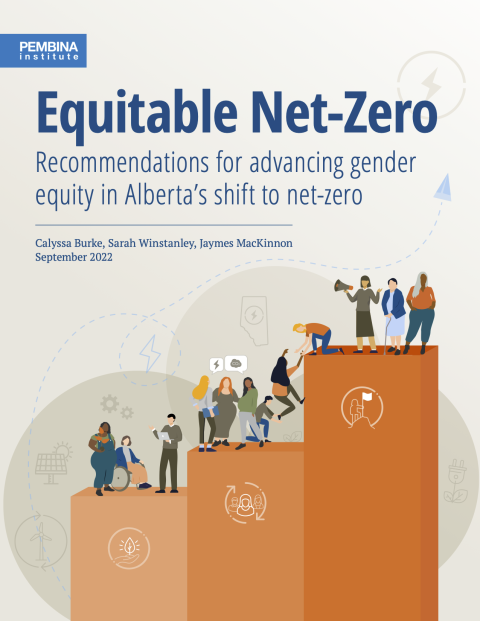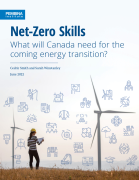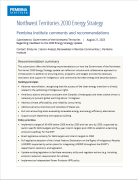Alberta’s economy is experiencing a period of immense change and opportunity. With billions of dollars in investment pouring into renewable energy projects and a growing consensus on moving the oil and gas industry to net-zero emissions, an energy transition is underway. Currently and historically, women and gender-diverse people face a variety of barriers to participation in the energy sector. These inequities will persist through Alberta’s energy transition if they are not actively addressed today by leaders across government, industry, and education.
This report builds on the Pembina Institute’s 2021 publication Women in Alberta’s Energy Transition, which identified five key barriers to women benefiting from and succeeding within the energy sector: lack of access to opportunity; lack of good jobs; inability to advance; income gap; and industry culture.
In response to these findings, analysts from the Pembina Institute convened a series of conversations with hundreds of women representing dozens of organizations — both in the traditional oil and gas sector as well as in the burgeoning renewables field — in Alberta. From those conversations, the Pembina Institute gleaned ten actions to dismantle existing obstacles to participation.
These recommendations provide leaders and decision-makers with tangible strategies to ensure women and gender-diverse people can participate and lead in Alberta’s energy transition. The concerns expressed by participants, as well as the recommendations they put forward for dismantling the barriers, are not specific to the energy sector. Indeed, they reflect broad recommendations for promoting gender equity in all sectors of the economy. However, this moment of transition for Alberta offers a unique and dynamic opportunity to initiate a change that is long overdue and so these recommendations should be acted on immediately.
Key observations
- Government, industry and educational institutions all have a role to play. The barriers faced by women and gender-diverse people are interconnected and compounding. As the energy sector continues to change, opportunity and responsibility for addressing inequity requires a coordinated approach between private industry, public governing bodies and educational institutions.
- Everyone benefits from a more equitable future. Creating an economy and work environment that includes many people and is safe both physically and psychologically for women and other marginalized people will increase the quality of life and economic prosperity of all workers connected to the energy sector. In addition to improving wellbeing, prioritizing gender equity in the energy transition has clear economic benefits. Organizations with gender-diverse teams and equitable policies have stronger organizational capacity, increased shareholder investment and a trustworthy reputation, both internally and externally.
- The energy transition must centre the needs of those who have been currently and historically excluded. The differential impacts of climate change on women and gender diverse people demands gender-sensitive climate action and strategy. Efforts to dismantle inequity within the energy sector must respond to how Indigeneity, race, disability and other social positions intersect with gender to create unique barriers to participation.
- We need to know more to do more. In order to make effective, evidence-based decisions concerning Alberta’s energy future, we need more access to disaggregated, region-specific data about the energy sector and those who work within it. Once accessed, this data must be used for the explicit purpose of addressing the inequities it reveals.
Policy areas and recommendations
Net-zero education and training
- Improve access to net-zero related training, certification and education for women. Tangible actions identified by participants in the research include increased funding to gender-inclusive programs and financial aid schemes, improving the accreditation process and forming partnerships between non-profits that specialize in supporting women in accessing training and clean energy companies.
- Invest in a range of mechanisms to enable women to access jobs and opportunities at all stages of their careers in the energy sector. This begins in early career development, with key stakeholders investing in paid opportunities for women to develop net-zero skills through internships and apprenticeships. As their careers progress, women benefit from formal and informal mentorship relationships, inexpensive networking opportunities, and an expanded scope of what is considered net-zero work experience beyond STEM fields.
Supportive energy sector workplaces
- Provide part-time, virtual and/or flexible work arrangements in the energy sector that offer access to benefits and do not impede the ability to advance. Standardizing flexible working patterns allows workers with caregiving responsibilities to balance their paid and unpaid work, without risking lower compensation or lack of benefits for doing so. The perks of flexibility extend beyond gender equity, providing mental health benefits for all employees.
- Invest in affordable, accessible childcare that responds to the needs of parents in the energy sector. Cutting down on the significant cost of childcare helps alleviate the burden of unpaid care work that is disproportionately carried by women. Comprehensive childcare programs allow parents to accept greater responsibility in the workplace, increase women’s economic participation and have been proven to raise provincial GDPs.
- Invest in, support and promote gender-neutral parental leave policies and supports in energy sector workplaces. Implementing gender-neutral policies like wage top-ups, mentorship programs for new parents, staggered returns and prorated bonuses destigmatizes parental leave for workers who fear that starting a family will hinder their career development. By making these programs available to all new parents, care work can be more evenly distributed across genders.
Culture and leadership development in energy sector environments
- Set quotas or targets to increase representation of women and gender-diverse people in the energy sector, especially in leadership — a 30% target is the minimum; 50% is the goal. Women — particularly those who are racialized, Indigenous, and/or disabled — remain vastly underrepresented in the energy sector. Organizations that prioritize building diverse teams outperform their competitors in sales and attracting investment and tend to consider environmental and social outcomes over short-term financial gains.
- Provide holistic, intersectional, and gender-transformative leadership development for men who lead within the energy sector. Equipping male leaders with the skills and training to participate in gender-inclusive work environments is critical to creating safer workplaces for women and gender diverse people.
- Create trauma-informed processes for reporting, responding to and preventing violence and harassment on energy sector worksites and in office environments. Implementing anti-harassment training and survivor-centric, culturally safe policies for addressing workplace violence are starting points to prioritize the safety of marginalized employees. Particular consideration should be paid to the experiences of Indigenous women, who experience high rates of violence within and as a result of the energy sector.
Data transparency and use within the energy sector
- Increase data collection and improve data transparency within the energy sector. Evidence-informed policy decisions regarding the energy transition require greater access to disaggregated data on compensation, representation and other critical metrics of equity.
- Ensure data collection and use within the energy sector are ethical. Data on the experiences of marginalized workers must be put to meaningful use through frameworks like The Grandmother Perspective, in order to better understand and dismantle barriers to participation.
The disruption of the energy transition is a powerful chance to address the energy sector's systemic exclusion of women and other marginalized groups. Implemented together, these recommendations will help ensure Alberta's new energy industry is able to both reflect and benefit from the province's rich diversity of thought, identity and experiences. To learn more about our findings, read the full report.
Equitable Net-Zero follows up from our 2021 report, Women in Alberta's Energy Transition.
Read more about all of our Women in Energy Transition work.










